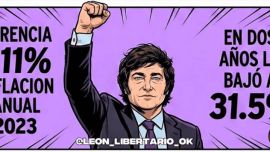President Javier Milei’s administration has inaugurated a novel political dynamic in Argentina characterised by pushing conflicts to the edge of the ideological frontier, only to pull back from the precipice in pragmatic fashion at the last second. To a certain extent, it represents the style of the “new caste” that has come to dominate top-level decision making, with the Caputo family front and centre.
The agonising approval of the ‘Ley de Bases’ bill at the Senate-level — it must now return to the Chamber of Deputies for the latest round of amendments to be ratified — was another example of the government’s strategy of “punctuated pragmatism,” by which President Milei and his anarcho-libertarian coalition unleash a brutal ad hominen attack against their political adversaries that appears to completely break down any possibility of collaboration, and at the last second agree to typical political concessions in order to succeed.
The first part of the strategy responds to high-flying political strategist Santiago Caputo, the “architect” of Milei’s presidential campaign and apparently the only non-family member to belong to the inner circle of trust of the President.
When push comes to shove and the Milei administration assumes it’s gone far enough, they bring out the pragmatist: Guillermo Francos. He absorbed the Cabinet chief post after Milei sacrificed his friend and former boss Nicolás Posse in the midst of the scandal at the Human Capital Ministry and the political stagnation of his flagship bill. The legislative victory favours the other Caputo, Luis ‘Toto,’ Argentina’s economy minister, delivering him breathing-room just as the financial markets had begun to feel rattled given the lack of political progress toward structural reforms that would help give sustainability to the economic plan that is anchored in the concept of a budget surplus.
A star trader during his years on Wall Street and the City of London, Caputo is seen as a banker and a hedge funder and not a macroeconomic expert, making him pragmatic by nature in the pursuit of financial profit. The minister, who effectively controls the Central Bank too through former business partner Santiago Bausili, had seen the government’s reserve accumulation plan challenged by a rise in the parallel peso-dollar exchange rate, as certain sectors (particularly agro-exporters), speculate on a potential future devaluation, leading them to sit on their stocks. With the post-law rally, Caputo has won himself time. Ultimately, Milei’s punctuated pragmatism could now be called the “double Caputo.”
While Milei’s political victory is far from complete, it must feel good to celebrate a legislative goal. It’s only the second win for the administration six months into their tenure, it’s not a small one and it came at a high cost. After heavy turbulence during debate in the lower house Chamber of Deputies, the government sought to get their “watereddown” bill through the Senate hastily, something they quickly found to be impossible.
Martín Lousteau, chair of the Civic Radical Union (UCR), quickly gained centrality as he became a leader of sorts for those opposed to the bill, including the pan-Peronist Unión por la Patria coalition and senators responding to provincial governors who sought to extract concessions. This circumstantial majority even battled to pass a bill modifying the formula used to determine pension payments, a shot across the bow given its impact on the administration’s fiscal plans.
At the same time, Milei’s flagship mega-portfolio, the Human Capital Ministry, came under fire, with the President’s close friend, Sandra Pettovello, in the eye of the storm for failing to distribute foodstuffs while a corruption scandal emerged. Tensions escalated and Milei was forced to come to Pettovello’s defence personally, exposing an important lack of political capital among the upper ranks of La Libertad Avanza. Longtime friend Posse was sacrificed, forcing the restart of several key areas of the administration including the relationship with top-level US officials. Arch-nemesis Juan Grabois proved cunning by exposing the political weaknesses of the government.
Francos delivered the victory by sitting down and negotiating with governors and senators, caste-style. While the bill had already been diluted, it remains substantial and together with the accompanying fiscal package represents an important mechanism to push forth with Milei’s agenda of reform. Vice-President Victoria Villaruel, who is occasionally at odds with the Casa Rosada, was forced to break the tie in the headline vote, and several times throughout voting on chapters.
Meanwhile, out on the streets, groups of organised hooligans looking to clash with the police effectively met security forces who were eager to show they are ready to hit first, ask questions later. The usual pathetic scenes of protesters and security forces locked in pitched battles in front of Congress helps to consolidate the new lines of polarisation between those in favour and those against Milei’s libertarian culture war. Inside Congress, Lousteau found himself isolated from his party in the Senate, despite being the leader of the caucus, voting in line with the Peronists and hitting his aspirations of becoming a leader of the opposition. Another victory for the government.
While anything could happen in the Chamber of Deputies, the expectation is that the bill should pass, as reflected by the rally in financial assets after the session. Six months in, Milei has almost passed his first bill and won’t be able to blame the caste for blocking him if things sour. If things go as planned, and with inflation retracting, the President will need to deliver his much promised “V-shaped” economic recovery if he is to push forth with his grand ambition of “making Argentina great again.” Several economists, many of whom are ideologically closer to the President than the Keynesian Axel Kicillof, have indicated that the intensity of the recession is becoming unsustainable, while the International Monetary Fund has called on the government to make sure the burden of the austerity plan doesn’t fall overwhelmingly on the poor.
Milei and Caputo know their plan requires the continued accumulation of reserves in the Central Bank’s coffers. The Economy minister has already indicated he will begin negotiations on a new IMF package while the President is telling the private sector that the budget surplus is not negotiable. A devaluation is out of the question, both of them say, trying to set expectations that will incentivise the liquidation of agro-exports, which are much needed in order to continue building reserves.
At some point, Milei and Caputo will have to lift currency restrictions. They desperately need investment and some sort of jumpstarting of consumption and output. It’s not clear what the next stage of the plan is, but getting the ‘Ley de Bases’ bill passed is a necessary condition for the president. We’ll see whether he now plays nice or quickly goes back to the usual lambasting of national deputies. It probably depends on how much time he spends abroad – and where he chooses to pick his next fight.
























Comments